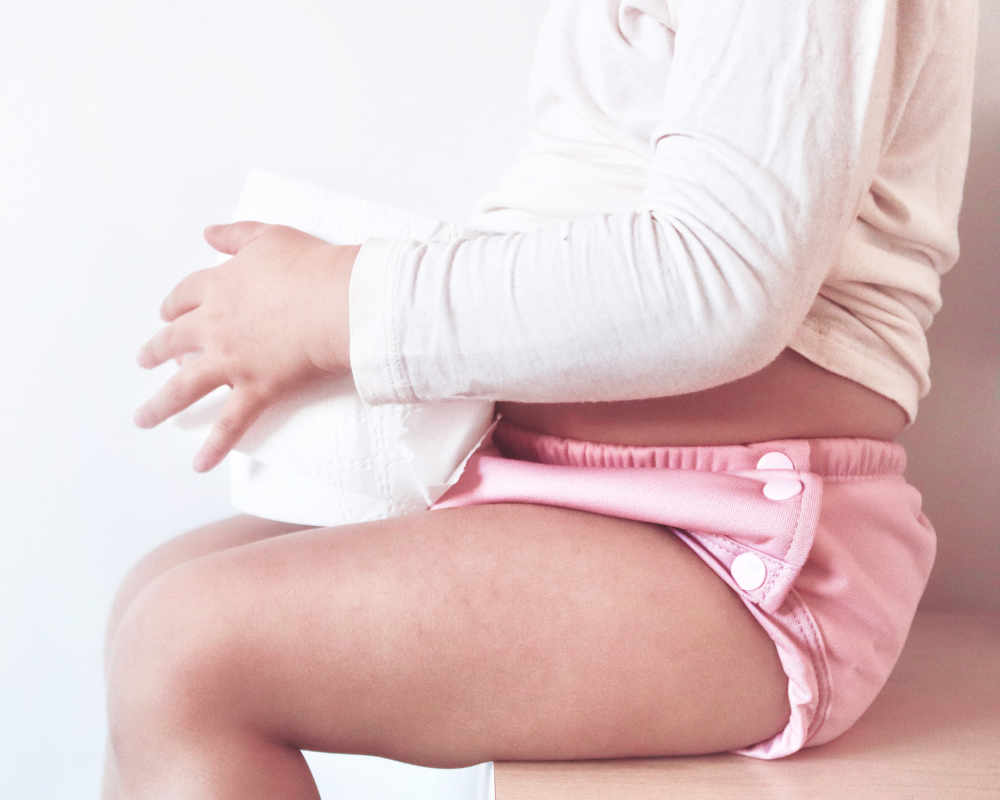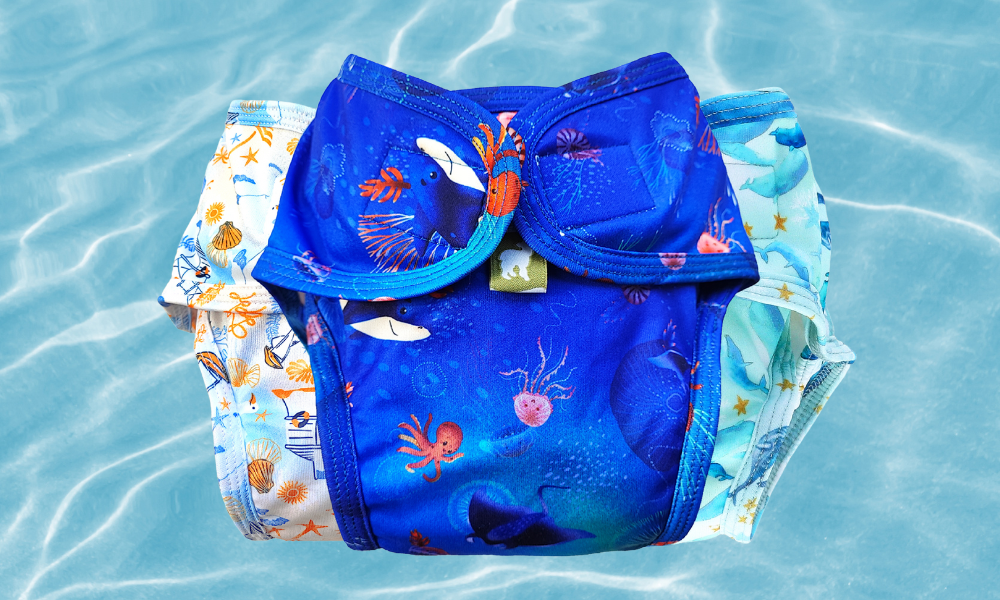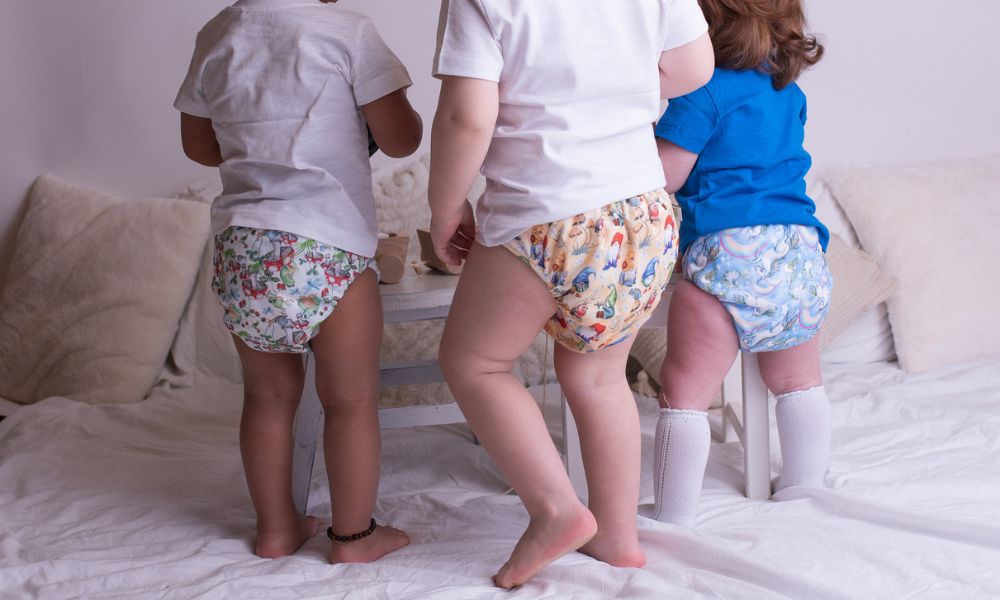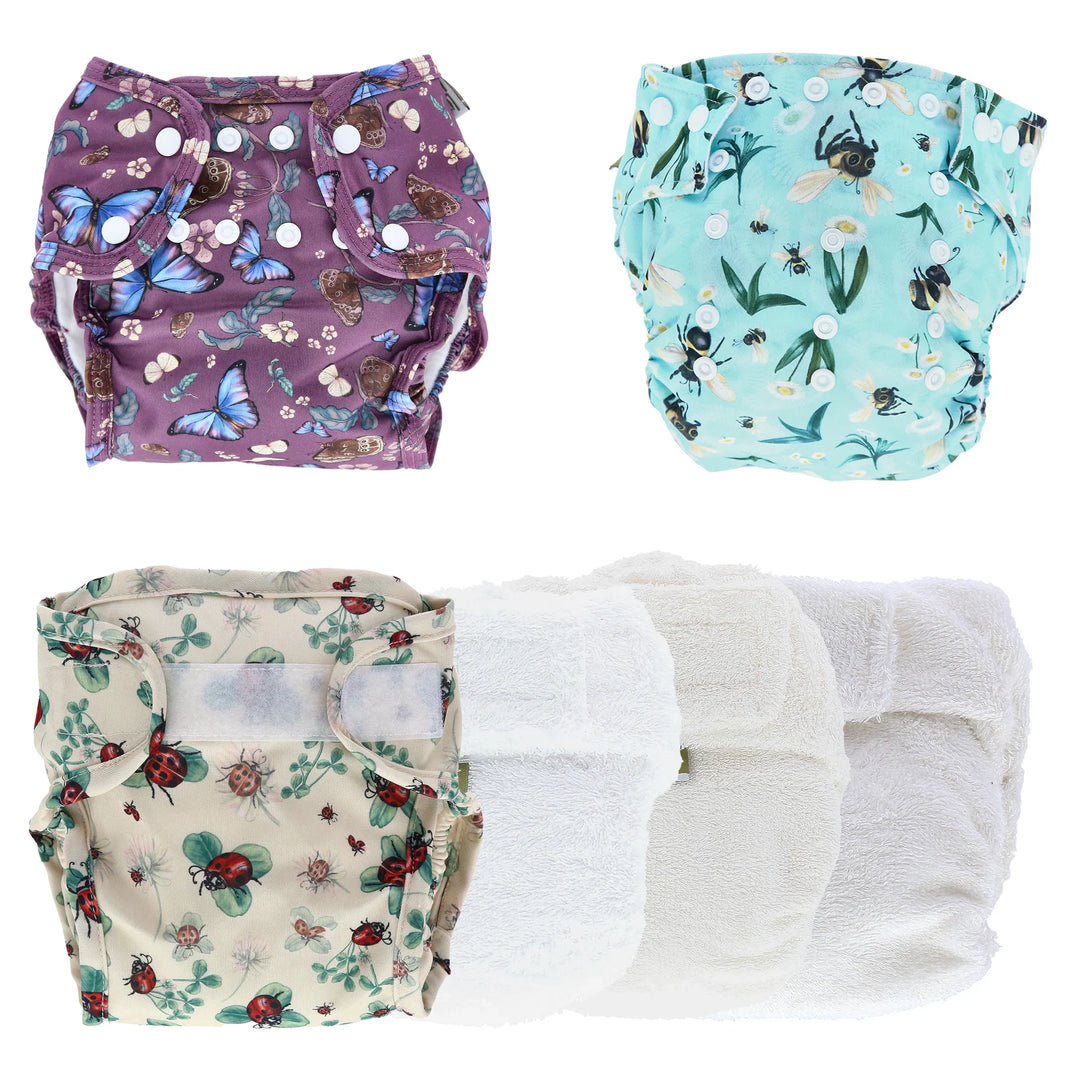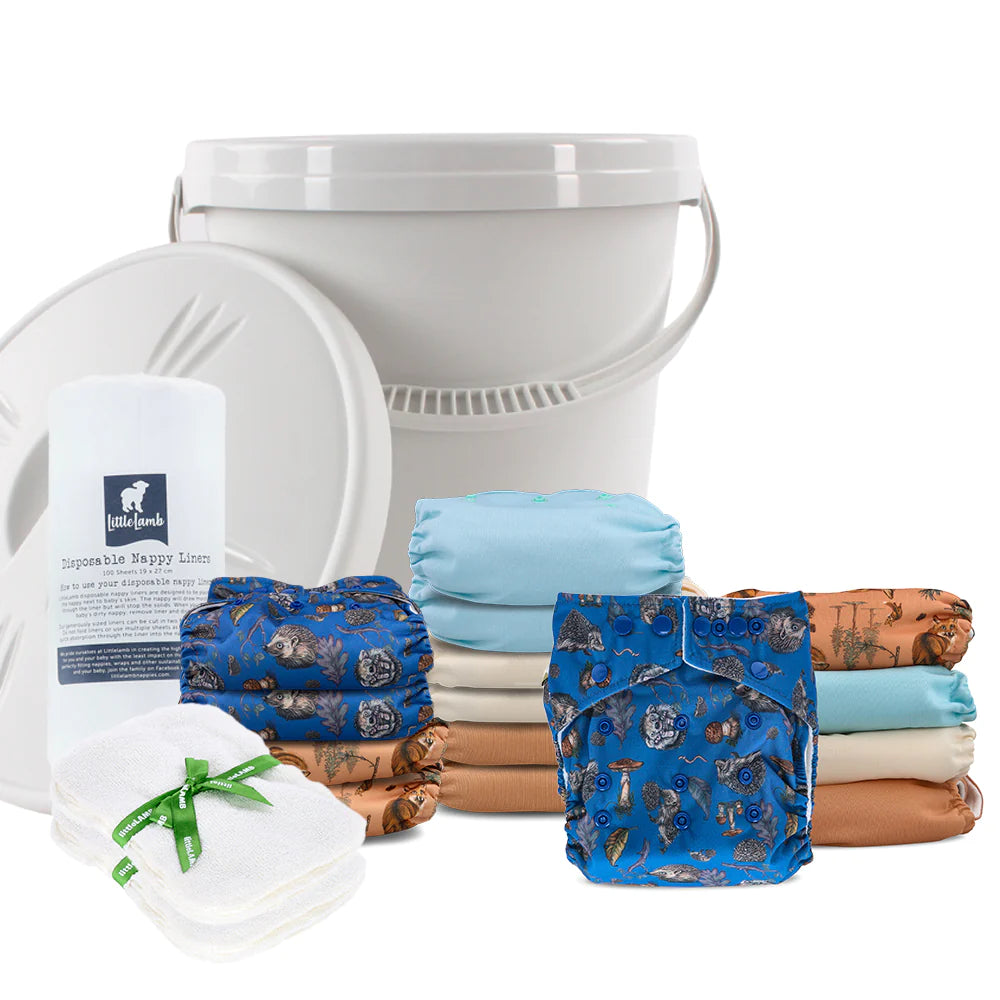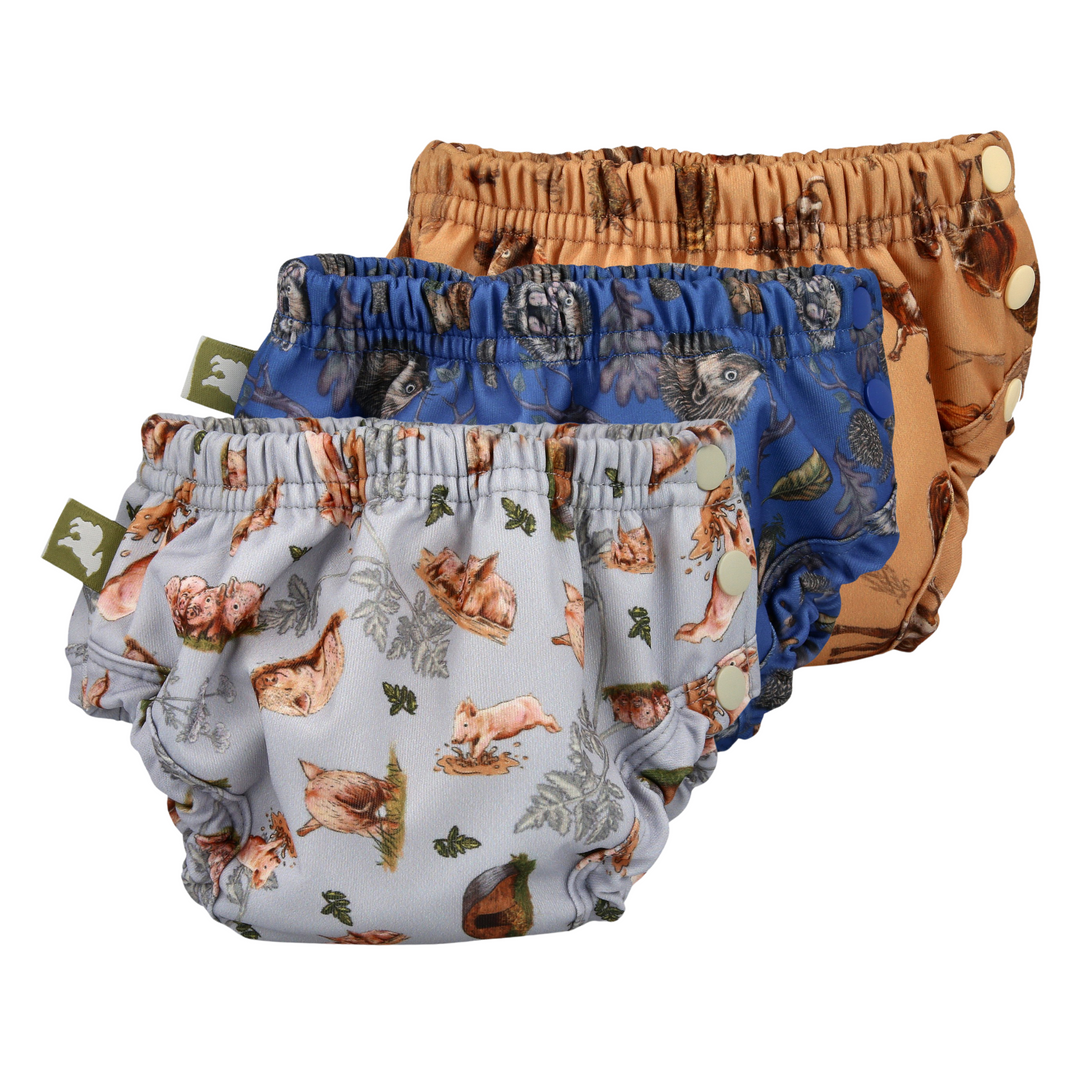Bamboo nappies are as they sound; nappies made from, or largely featuring, a bamboo viscose fibre. Bamboo viscose is a relatively new man-made fibre and is often referred to as eco-friendly because it is naturally fast-growing; needing no false irrigation, no pesticides or fertilisers.
In reusable nappies, the bamboo viscose is knitted or woven into a fabric which is extremely soft and super absorbent. At LittleLamb we use bamboo a lot! We use it in our super popular fitted nappies, and also in our booster pads, disposable liners and breast pads.
In disposable nappies, the bamboo viscose is an absorbent pulp, which is more sustainable than regular wood pulp (mainly because bamboo grows much faster and is, therefore, more renewable than regular paper pulp) making bamboo disposable nappies a more eco-friendly version of regular disposable nappies.
What are bio-degradable nappies?
Biodegradable nappies are nappies which have biodegradable components. However, consumers should beware that these terms such as ‘biodegradable’ tend to mean far less than most consumers believe. In reality, “green-friendly”, “bio-degradable” and “eco-friendly” have become marketing staples that have little to no scientific backing, and more importantly, very few regulations. In the UK at the moment, there is no current UK standard that nappy manufacturers must comply with to claim that their nappies are “biodegradable”.
2020 introduced a slight change by the British Standard Institute with a voluntary standard to verify claims about biodegradable plastic. However, this only applies to products that break down in the open air rather than those left in a landfill.
Certain parts of the nappy are always non-biodegradable, including the outer layer, which likely contains polyethene film and sticky closing tabs.
Will biodegradable nappies break down?
The main problem with disposable nappies is that they won’t break down in landfills, where most of them end up. Or, they won’t even have the chance to biodegrade as the nappies have been placed in regular rubbish collection, which 87% in the UK gets incinerated! We believe producers of biodegradable nappies are presenting their products as a solution to the mass-produced waste problem facing the globe at the moment when in reality they are contributing to masking the issue with green-washing..
According to researchers, biodegradable materials will not degrade effectively when placed in a landfill. To fully biodegrade, oxygen and microbes are needed, so most biodegradable nappies need to be composted rather than in a landfill.
Composting for nappies in the UK waste management system is currently not available. For biodegradable nappies to become a sustainable solution, there would need to be a significant shift in managing these products once they are in waste.
To their credit, top sellers of biodegradable nappies are not directly hiding this issue. Many freely admit that their products will not degrade the way they intended in a landfill environment.. However, this does nothing to fix the issue that they present. They are far from the right solution to the environmental problem caused by disposable nappies. Even products which are rightfully marketed as compostable will do nothing if they end up in a landfill, if the nappies have made it to a landfill, most will be incinerated, contributing to the warming of our planet.
Can Parents Impact Whether Biodegradable Nappies Will Break Down?
Some producers of biodegradable nappies have suggested that consumers can help their products break down by disposing of them the ‘right way’. They suggest putting them in a biodegradable sack outside of the main bin liner to ensure that they get the correct exposure to oxygen. Some even suggest composting in your own back garden, but when a baby uses approximately 50 nappies a week; this DIY compost will quickly grow out of hand… Let alone stink!
At LittleLamb, we believe that the government should help the manufacturers develop a better solution and regulate marketing claims of “biodegradable”. However, whilst we wait for the government to address this issue, we think using reusable nappies is the way forward!
Are biodegradable nappies recyclable?
It’s common for parents to assume that biodegradable nappies can be put in recycling because they are - as the name suggests - biodegradable. However, this is not the case, and even nappies which meet the correct biodegradable standards are not compostable. It’s also worth noting that human waste is not allowed in residential waste management systems (e.g. rubbish bins); it should always go down the toilet!
So, are biodegradable nappies better?
We would recommend buying eco nappies based on a different set of eco-credentials, not ‘bio-degradable’ until there are some firmer standards to hold these companies to. Instead, we suggest turning the focus to the making of the nappies; choose companies that have ethical production practices and have sustainability commitments. At LittleLamb we know using reusable nappies for every single nappy change is unlikely, and we do not want to demonise disposable nappies, we simply want consumers to think about the best outcomes from disposable nappy use; we think choosing a sustainably made product is better than choosing a misleading ‘bio-degradable option if all these biodegradable nappies are just ending up in regular rubbish bins!
Are reusable nappies better than bio-degradable?
We've seen enough research to believe that reusable nappies are better for the planet than eco-disposables. Still, there are flaws; the water and energy required for washing and the time parents have to give up to manage reusable nappies. However, if the choice to use reusable nappies is 100% to help the environment, here are our tips to have the least amount of effect on the environment;
- Buy second-hand
- Use the same nappies on subsequent children
- Air-dry nappies wherever possible
But in all honestly, the most eco-friendly option is elimination communication; no nappies at all!
If you’d like to do your own reusable nappy research, these are our top resources;
https://www.youtube.com/watch?v=N042Auj6DCI
Environment Agency Lifecycle Assessment for Disposable and Reusable Nappies in UK, 2008
Rezero research project – Zero Waste Report - The Environmental & Economic Costs of Single-Use Menstrual Products, Baby Nappies & Wet Wipes, November 2019
Watch one of our LittleLamb customers Hayley review our Little Lamb bamboo Nappies:





